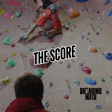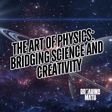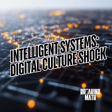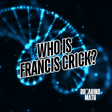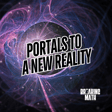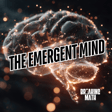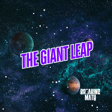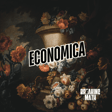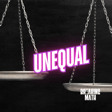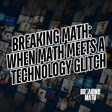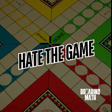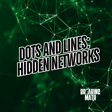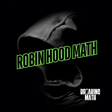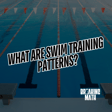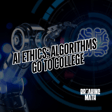Become a Creator today!Start creating today - Share your story with the world!
Start for free
00:00:00
00:00:01

77: An Interview with Christopher Roblesz of MathNMore
Christopher Roblesz is a math educator who, until the pandemic, worked as a teacher. It was his experiences during the pandemic, and his unwavering passion for preparing disadvantaged youth for STEM careers, that eventually led him to developing mathnmore, a company focused on providing an enriched educational experience for sstudents who are preparing for these careers.More on energy and entropy next time!All of this and more on this interview episode of Breaking Math!
[Featuring: Sofia Baca; Christopher Roblesz]
Transcript
From Teaching to Math & More: Christopher Robles' Journey
00:00:00
Speaker
Christopher Robles is a math educator who, until the pandemic, worked as a teacher. It was his experiences during the pandemic and his unwavering passion for preparing a disadvantage used for STEM careers that eventually led him to developing Math & More, a company focused on providing an enriched educational experience for students who are preparing for these careers. All this more on this interview episode of Breaking Math, episode 77, an interview with Christopher Robles of Math & More.
Episode Introduction with Christopher Robles
00:00:30
Speaker
I'm Sophia and this is Breaking Math. So today our guest is an educator, Christopher Robles. Good to have you on first of all. Nice to have you here. Thank you so much. I'm glad to be president amongst this podcast and amongst your team. I'm so excited to be here.
00:00:45
Speaker
before we get to talking about learning I have a message I think you're gonna want to hear about and I'm kind of surprised I'm telling you this but before I get to why I'm surprised so I've had a lot of trouble with productivity with a show and a lot of stuff like that in the past it's not that I don't like doing the show I love doing this show but
Boosting Productivity with Magic Mind
00:01:01
Speaker
You know, sometimes your creativity like runs out, runs short, whatever, or you just can't get started on a task. And I have ADHD. I, you know, drink a lot of coffee for it. I have my own medicine. But, you know, some I felt like, you know, there's a little something lacking and lo and behold, a solution found me.
00:01:17
Speaker
Magic Mind. So Magic Mind is like a shot of mushrooms and other kind of stuff. You can see the ingredients on the website magicmind.co. Yeah, the benefits that they list on their site, I looked them up, cross-referenced them with papers, like no real scientific papers. And I was able to find, you know, the benefits like documented in different sources like these.
00:01:38
Speaker
Cordyceps, one of the mushrooms that they use in there, is specifically said to make the mind clear and boost immunity and other complex functions such as the accessibility of oxygen. So if you want to try it, go to the site and get a 56% off your first subscription or 20% off a first time purchase. The 56% discount is valid for the next 10 days. The 20% discount is valid forever.
00:02:00
Speaker
So I recommend it. I'm surprised I'm recommending it. I told myself I wouldn't recommend a supplement on this show unless I truly believed in it and lo and behold I do. So go to the site magicmind.co and get 56% off your free subscription and 20% off a one-time purchase with a code breakingmath20.
00:02:18
Speaker
So now that I've told you that, let me just tell you a couple other things.
The Role of Passionate Math Educators
00:02:22
Speaker
You could email us at breakingmathpodcast at gmail.com. And of course, you can always follow us on Facebook, see what our post is about on the Facebook shop. So now, Christopher, let's get back to education. So the thing I like about having math educators and educators in general here on the show is that for a lot of people, education is like
00:02:43
Speaker
a rote, a one and done thing. Like, you know, you learn algebra, you go to some book labeled algebra and you know, algebra. But when, when you're an educator and you're really invested in this kind of stuff and invested in teaching, you know, people who want to learn, you see it more as like more of a process, more of a set of like, you know, things that are worked upon. And I feel like your experience reflects that.
Making Math Engaging: Founding Math & More
00:03:06
Speaker
So I guess without further ado, do you want to talk about how you started math and more what happened during the pandemic?
00:03:11
Speaker
Absolutely. So I found it math and more simply because there are so many different avenues and so many different ventures to say about literature and reading and things like that. It's like, dear time, drop everything and read and like books on wheels and all of these different programs that gets kids excited about reading in general. But when it comes to mathematics,
00:03:34
Speaker
There's not that same sort of excitement. In fact, there's the contrary. Where is math and how do I use math in life and all of these different things? And I'm just like, that's not what Math & Moore's mission is. So Math & Moore was founded simply to curate a programming that was allowing students to experience math in a dynamic and youthful way that was not scary or
00:03:59
Speaker
anything that was not going to engage students in a fun, unique, exciting way. So I don't even call my students mathematicians. I call them mathematicians. And even so, in Math & More, you are a mathematician. I am a mathematician. We're literally just taking this language that we call mathematics and using it in a fun and exciting way.
Fun with Math: Pi Day Activities
00:04:20
Speaker
Yeah, this I mean, that's definitely the problem, especially like you said, with math versus these other things. I'm curious if you've run into the essay of mathematicians lament. I have not. I'm not familiar with basically quite a lot of what you're saying put in a different form where
00:04:37
Speaker
basically he says like he imagines a universe where instead of being taught art children were taught paint by numbers and color theory before they learned how to free paint and how much that would mess up art education and they did a similar and he goes through a couple examples like this and he talks about how math is like it's almost like designed the way that we teach math to make people hate math. Correct. So you've mentioned these engaging activities can you give us an example of something you developed fairly recently?
00:05:06
Speaker
Alright, so Pi Day in and of itself is not something that, again, I curated by myself. Pi Day is a day that is celebrated by mathematicians all around the world. So 3.14 or 3.14 March 14th is the first three significant digits of Pi, right? So mathematicians and
00:05:24
Speaker
mathematicians all over the world decide to celebrate this day of mathematics to allow students to grapple and deal with mathematics and circumference and diameter and all of these different circular objects and like math problems on March 14th every single year.
00:05:42
Speaker
what I've done and taken Pi Day is bringing all of the different activities and programs together to say, here are the major things that you can do on Pi Day with your students, your staff, your team, whoever, because this is a time for all students of all ages, right? So there is a pie eating contest, there is
00:06:05
Speaker
pie to the face. There is pie decorating contest. This year, we're going to have a three legged race. There's so many different things that's happening at Pi Day here in Atlanta on Piedmont Park that may not necessarily be your traditional math class, but like what the purpose of this is to organically build a and foster a relationship with mathematics. That's not scary.
00:06:27
Speaker
Yeah, exactly. I mean, like, I assume I'll have at least a couple of listeners who are thinking like, you know, well, why don't you use the word mathematician and try to, you know, remove the negative connotations that it has versus replacing with mathematicians. But I, but I honestly think that it's a pretty brilliant approach.
00:06:46
Speaker
to use this word mathematician because I mean I've run into people who can explain to you that if you have five baskets with six apples each you'll have thirty apples but when you ask them what multiplication means they'll freeze up. I had a tutoring client where she didn't really know what anything besides addition meant and we had to use pebbles to kind of get through to her so
00:07:13
Speaker
So, yeah, I totally I totally understand all this.
Math as a Language: Integration with Other Subjects
00:07:17
Speaker
I guess you might say almost politicking on the behalf of math or not even politicking at math as a language versus looking at math as a subject. Right. Yeah. One of the things that has made me so unique about.
00:07:34
Speaker
teaching math in a positive and engaging way is that I told my students that this is a subject matter and not just a content experience that you see. When you walk into social studies and you walk into a science class and you walk into an English class, what's the language that you see? I apologize, not mathematics, but you see English. But then most
00:07:55
Speaker
In most cases, in most school systems, when you're looking at a master schedule, mathematics is the only class that is taught in isolation. You can reference English and social studies. You can reference English and science, but there is no reference to mathematics. So the genius behind math and more or the genius behind teaching mathematics is that we're teaching a language here.
00:08:22
Speaker
you are not going to be able to sit in front of a Algebra 1 end of course exam and pass it if you don't know what the Pythagorean Theorem is. Oh yeah, not just what it is, but like, you know, how to apply it like in everyday life, you know, like to look at your thumb and your forefinger and know that it means the distance between the tips of the two if you hold them out in an element.
00:08:44
Speaker
correct and not just know what it means, but then look at a coordinate plane and say, all right, well, I can move this amount of spaces on the x-axis, move up this amount of spaces on the y-axis, and this will be the difference between these two points.
00:09:00
Speaker
and or know that later on in mathematics that this is now the distance formula and or know that this is now slow and or be able to build a relationship between all of these different things that is honestly just saying the same thing just in a different language. But if I don't know or decipher between the two different languages, I'm not going to be able to be successful in any of it at all. In fact, I'm now turned off by it because you said the same thing three times just in three different ways.
00:09:30
Speaker
Yeah, the student told me are we rephrasing things versus you know, giving them unique ways of looking at things I used to always think sometimes as a in as a student in certain classes It's like well, I you heard that you heard the question so you know that I'm trying to learn So why are you fighting me on this kind of thing? Correct?
00:09:47
Speaker
And that's what it feels like for a student. So moving a little bit on, and we'll come back to this subject area because there's a ton of fruit in it, but just moving on briefly to your passion for working with disadvantaged youth in STEM. Do you want to talk a little bit about where that passion came from and how that manifests in Math
Robles' Educational Journey and Constructive Thinking
00:10:06
Speaker
and More?
00:10:06
Speaker
Yes, absolutely. So essentially being the educator that I am and I love teaching, I love curating programming, I love all those things. But the reason why I went into education and the reason why I love education so much is because I went to a very unique school system. I went to a school system that allowed and fostered
00:10:25
Speaker
constructive thinking and not just constructive thinking in a way that is like this abstract idea, right? Like not what we consider constructive thinking or grappling today. It was, I am able to grapple and go back and forth and banter with a teacher without it being labeled as disrespect. Almost an exploratory mode of learning. Correct.
00:10:44
Speaker
And I also was in a school system that allowed for the teachers to give me feedback and it was able to be digested and not a critical way and everything is so sensitive nowadays. So to make a long story short, the reason why, and I'm just going to be really vulnerable in this moment, I hated English language arts. I was reading behind a
00:11:06
Speaker
I was in fifth grade reading on like a second grade level. At the time that I went with that, I was in fifth grade. And regardless of what people say, your environment, what's going on, all of that has to do with what is going on inside the classroom. So I love my parents, right? I really do. And they were going through what they were going through. I'm not going to take that away from anybody. All of that stuff is like prevalent and important. And all of that is there.
00:11:33
Speaker
But where a student comes from and how they develop and move and what their passions are is a direct relationship to what is happening in that classroom, in that home environment. And that's why I curated Math & More because the school system that I went to said that, you know what, Robles, we're not giving up on you. This is what it was. They knew that English was a subject area that I
00:11:55
Speaker
I hated, didn't want to do. In fact, one of my beloved English teachers from elementary school sat there and pulled me to the side one day when I rewrote the back of a book and said, this is my summary. And she was like, this ain't your words. This is not what you were trying to say. This is not what you were trying to say.
00:12:11
Speaker
going to say this is not this ain't it like i know i i can read the back of this book and know that this wasn't you what were you what did you really want to say and i'm like when i had that intimate moment with her which is like i honestly didn't read the book because every time i tried to read the book i got frustrated i didn't know what was going on i didn't like it i it was too much going on but then when they put a math problem in front of me i was able to say
00:12:33
Speaker
This is two. This is four. This is whatever the number was and able to solve that and then give you an explanation on how I got there, right? Because that's important. Not just knowing that two times two is four, but knowing that two groups of two is four people or four things or four objects.
00:12:50
Speaker
being able to articulate and explain that. So that's genuinely why I got into it. And then, statistically speaking, males are more prone to going into mathematics. And I really do think that the psychology behind it all and who I am as a person, that allowed me to say, I like mathematics more. This is actually able to speak to me as who I am because I like to solve things. I like an answer. I like a solution.
00:13:16
Speaker
So when you're able to speak to me as a person, and that's what was so great about the educators that I had in my life, they were able to say, well, Robles just wants to know what the bottom line is. No fluff, no in-between, no mixture, but what is actually happening between this problem, what I'm giving him, and what the solution is.
00:13:37
Speaker
Absolutely. And it kind of brings me back to something you said earlier about going into an English class and seeing, you know, English, but going to a science class and seeing English and even going to a math class and seeing English. It's kind of fascinating if you kind of like go back in the history of math a little bit, because it's not too far long ago that, I mean, the compendious book of calculation or
00:14:00
Speaker
Algebra, whatever the book that algebra comes from. I know that a lot of the theorems in there are worked out in sentences instead of, you know, notation form. Like they say, like, you know, thing plus one times thing plus one is square thing plus twice thing plus one. And, you know, reasons through it and stuff like that. You also talk a little bit about vulnerability.
00:14:24
Speaker
And how that could really help like you know kind of clear out like you know the the drain pipe so to speak like as far as education goes I mean it definitely drives with my I always say that the first time that I tutor somebody It's like it's me trying to get them less scared of the idea of math and sometimes even learning
00:14:41
Speaker
Honestly, perfect. It was just being able to be vulnerable, being able to speak. In fact, I don't know if you've ever heard of Rita Pearson, but like being able to be a kid or a scholars champion, like that is always something that is important, right? And I really think that that was like pivotal in my educational journey and like being a student and also being a scholar.
00:15:04
Speaker
My teachers, my educators, my role models were always a champion in my life.
Championing Students Through Challenges
00:15:10
Speaker
And Rita Pearson really put a head to the nail, or as I should say, is that I am that student's champion. And that's where I was able to curate this program called Math and More because I am literally my student's champion. There's nothing that they put in front of me.
00:15:26
Speaker
that even if it's a problem that I've never seen before, because I'm not Jesus, I'm not God, I don't see every math problem, I don't know every single thing that comes in front of me, right? Which is why I use that verbiage in languages, I'm a math magician, I just get kids excited about math. And then we solve it together, because at the end of the day, there's a solution to every problem. Until there's no solution, that was intentional.
00:15:51
Speaker
But yeah, like there's always something about a math problem that gets kids excited to say like, this is, you know what? I can solve this. There's always an answer. There's always something going on that allows me to get to the bottom line of this root problem. So, and that's where, again, my teachers and my adults in my life were like, I am your champion. I can support you on. You can get to whatever solution, whatever end goal you want. And that's what I do for my students.
00:16:20
Speaker
I am your champion. What do you want to do? If you don't decide right now in this moment that this is something that you want to do or you don't know what you want to do, that's OK. But we got to get somewhere. There's an end goal in mind. So let's work on that end goal and let's solve whatever it is together. And through that, I'm able to curate a culture of mathematics and liberation and love and passion and all of the different things that are infused in all content areas, honestly.
00:16:50
Speaker
But specifically to math, because now I'm really am teaching you a new language on how to look at life, how to look at math, how to look at these solutions and all of these different things that is being presented in front of you.
00:17:03
Speaker
This podcast is sponsored by Ramp. Are you the decision maker in your company? Consider this. For the first time in decades, there's a better option for a corporate card and spend management platform. Meet Ramp, the only corporate card and spend management system designed to help you spend less money so you can make more. Most corporate credit cards offer points as incentives, but those points amount to less than their worth in real cash value. Ramp's corporate cards offer you cash back, real money in your pocket.
00:17:30
Speaker
Plus, you control who spends what with each vendor. And RAMP software collects and verifies receipts automatically, which means you'll stop wasteful spending and close your books in hours instead of days. Businesses that use RAMP add up to 5% to their bottom line the first year. If you're a decision maker, adding RAMP could be one of the best decisions you've ever made. And now get $250 when you join RAMP. Just go to ramp.com slash easy. ramp.com slash easy. R-A-M-P dot com slash easy.
00:18:00
Speaker
Currents issued by Sutton Bank and Celtic Bank members have DIC terms and conditions apply.
00:18:03
Speaker
Hey guys, it is Ryan. I'm not sure if you know this about me, but I'm a bit of a fun fanatic when I can. I like to work, but I like fun too. It's a thing. And now the truth is out there. I can tell you about my favorite place to have fun. Chumba Casino. They have hundreds of social casino style games to choose from with new games released each week. You can play for free anytime, anywhere, and each day brings a new chance to collect daily bonuses. So join me in the fun. Sign up now at ChumbaCasino.com.
00:18:34
Speaker
Okay, round two. Name something that's not boring. Laundry? Ooh, a book club. Computer Solitaire, huh? Ah, sorry, we were looking for Chumba Casino.
00:18:50
Speaker
That's right! ChumbaCasino.com has over a hundred casino-style games. Join today and play for free for your chance to redeem some serious prizes!
00:19:06
Speaker
We had a guest on here one time who I can't remember if she told me during the podcast or after the podcast, but she told me about how math trauma can not only be passed on from like a teacher being like, you know, abusively teaching a kid or a parent like, you know, like trying to like shove like, you know, math down like a kid's throat in an effort to get them to do well on their homework.
00:19:30
Speaker
But it could also be transferred in more subtle ways down family lines and even from teacher to student without a single ill intent or even bad practice in the way. And you talked earlier about the role that vulnerability plays in education, kind of making it easier for people to learn when they're vulnerable about what they can't learn.
00:19:51
Speaker
And just from what I know about vulnerability from shame researcher Brené Brown, she says that shame is about secrecy and silence and some other thing. But secrecy and silence obviously have no place in education.
Vulnerability in Education: Impact on Learning
00:20:07
Speaker
So I was going to ask you, you know, you are trying to reach disadvantaged kids and stuff too. I mean, I saw your website has a donation option as well. And I want to encourage everybody to go to mathandmore.com and donate what you can to this cause. But like, how does vulnerability play a role with you and your students and between you and your students? Or can you talk to that at all for a bit?
00:20:31
Speaker
Absolutely. So the year that I had the most success, I will disclose and be transparent and say that I've had these kids for about two years prior to the year that I had them as a teacher of record. So I was their special education or co-teacher or student support teacher. I'm not sure what school district people are tuning in from, but all the languages and all of the things are the same, right?
00:20:56
Speaker
So I had these students for about two years prior to actually having them as a teacher record. So my certification is in multiple different areas, special education being one of them. And then the year that I was like, enough is enough. Like I can do this without tooting my own horn. But I was like, I can do this better.
00:21:13
Speaker
Oh, yeah. There's so many educators that are coming to that same conclusion, I see. But yeah, continue. Right. So I was like, I didn't mean to toot my own horn, but like that third year, I was like, I'm not going to sit on the sidelines and like watch this happen for a third year. So I was able to introduce what is called metacognition and
00:21:34
Speaker
It is a level of vulnerability, and I feel like honestly, when I was in front of the kids, I had no problem saying, you know what, y'all? This ain't it. I made a mistake. Let's go back. Find my mistake, y'all. What was my mistake? Go back, find it. Here's extra credit points. I clearly messed this one up because I'm creating my problems from scratch.
00:21:55
Speaker
doing these things from scratch. And I'm like literally telling them like I am not like this is not it. And I feel like my students has so much respect for me when I was able to say I messed up this problem. This is not the problem. I thought that this was going to give me two comma three. But now we got two to the square root of minus one. And like that's not a perfect anything. And like that's not on this. This is not the solution. Right. It's not the solution we're looking for.
00:22:24
Speaker
However, they were able to say, oh, you know what? Now it's a competition. Now it's a thing to say, you know what? I got Mr. Robles. Let me go ahead and solve this real quick. And now they're invested in who they are because they've been tuned in and they're listening to what I have to say. And all I'm doing, I like to tell myself and tell my students, well, tell my parents. My students don't necessarily understand it quite yet. I'm just a facilitator of learning.
00:22:51
Speaker
I am allowing you to self-discover what is happening in mathematics and then curating and fostering an environment that allows you to be okay with who you are, wherever you are at it. I'm not saying that you had to be perfect at it. I'm just saying I'm meeting you where you are.
00:23:10
Speaker
So have you had any students who were kind of thrown off by your approach of being vulnerable with them? Absolutely. So I've had students that looked at me, I was just like, oh, so you don't even know what you're talking about.
00:23:25
Speaker
No, no, baby. I love you to death. I am a subject matter expert, but I am not Jesus, nor do I profess to be. I make mistakes and mistakes are a part of life. And it's the same reason why in mathematics, we only use pencil. We don't use pen.
00:23:42
Speaker
there's no math teacher on the face of earth would say, come to my classroom with a black ink pen. That is going to look real crazy or any sort of assignment that you give them. We always say come to class with a pencil. So it's all about phrasing what you want to say. It's all about inviting them into what you want that like the end result to be. If I say no pens in my classroom,
00:24:08
Speaker
I'm not using no pens in my classroom unless I'm grading a paper. I'm saying no pens in my classroom and then giving them examples just like I gave you of reasons why I only use pencil because I make mistakes. And you're bound to make the same mistakes that I just made by teaching this class and teaching this example that I gave you that I now know that I've taught.
00:24:29
Speaker
and putting in my head four times. I didn't sat there, I didn't lesson plan, I didn't look at the example, I didn't went over the example, I didn't get all examples, I didn't get everything I was supposed to do. Now I'm in front of you and now here I am making a mistake and forgot to plug in a positive and or a negative. And now the answer is totally different than what my answer key was supposed to be, right?
00:24:48
Speaker
Oh, yeah. And then you explain. I mean, I often say that you don't see how something is working better than when it's broken. So I think it's invaluable for students to not only know, for students not only to know how to check for mistakes, like, you know, how to like, you know, do checksums and things like that at the simplest level, but at the most complex level, it's like, you know, if I'm doing a math problem and I end up with the weight of the moon being 39 pounds, if something has gone wrong. Correct.
00:25:10
Speaker
And it's just that ability to step outside of the system, I think requires, like you said, a free kind of open exploratory mode of learning, which also happens to be the mode of learning used by hunter-gatherers. So, I mean, not to say that natural is always the best, but people were hunter-gatherers longer than any other economic system, and so we're probably geared to learn exploratorily, you know what I mean? I mean, there's a reason why rote is called rote, not fun.
00:25:40
Speaker
Um, cool. So let's see. How do you do it? Do you do anything? Um, speaking of, uh, a Pi Day and so like, did you do anything on June 28th? No. What is June 28th?
00:25:51
Speaker
Tau day. I'm surprised you haven't heard of that. There's an idea that, you know, tau being 2 pi is sometimes easier for students to learn things like cosine and sine on because it simplifies the unit circle to fractions of the unit circle in terms of tau. So halfway across is half tau.
00:26:11
Speaker
It simplifies a lot of formulas. Yeah, it's pretty fun. Cosine and sine and tangent is one of my favorite subjects to teach, especially when we get into dissecting the unit circle and what it means. I make a reference to the big, comfy couch. I don't know if you remember the big, comfy couch, but moving around.
00:26:35
Speaker
sign cosine intention as far as like the clock in time. And I haven't heard of this. I'm corny. I'm not gonna dive too much into it. But I can definitely like when cuz I don't I forgot the name Molly. She's the clown on the big comfy couch and she like she's moving her legs and arms.
00:26:52
Speaker
Oh, yeah, the the the the clown clock. Yeah. Yeah. But then using that as an analogy of sine cosine and tangent and like being able to say like what is positive and negative and what quadrant of the coordinate plane and things like that. That's what never mind. I feel like I'm going way deep into the sine cosine and tangent. But it's definitely something that I infuse into my classroom. But then that goes into that vulnerability piece of me like
00:27:19
Speaker
I just am a clown sometimes in my classroom. So sometimes my students are like, what is he talking about? But then I see them taking a test. And they're like, Molly in the big, comfy couch. And I see them doing it. And I'm like, OK. So I wasn't that corny because now they're counting it and they're doing it in their head. And they're like, all right, well, let me make sure I solve this. So.
00:27:39
Speaker
Oh, yeah. I mean, sometimes corny is best. I mean, the way that I learned, uh, which is the lesser sign, which is the greater sign is the alligator eats the bigger number. Right. I mean, like, you know, I mean, and eventually that just becomes second nature, at least if it's a done, I mean, I mean, mnemonics are cheesy, cheesy. I mean, we could, I could do a whole episode on mnemonics and math, but, um, let's see. Um, look, moving on to, and you're located in Atlanta, correct?
00:28:04
Speaker
currently located in Atlanta, but I've been teaching and educating youth all across the East Coast. I started in New York City. I moved along to Miami, Florida, Miami, Florida. I moved to D.C. D.C. I was in Orlando for a little bit. And then I moved back to Miami and now I'm in Atlanta where I
00:28:24
Speaker
served lastly as a school administrator. And then also during the pandemic, I served as the special education coordinator or the district coordinator for special education for a charter school in New York City. So, yeah.
00:28:39
Speaker
All right, cool, yeah, just curious, because I know that the cities on the east of the United States are a lot bigger than we get here in the center of the country, or southwest of the country. And I imagine that you're dealing with fallout, not only from no child left behind, but you talk about specifically needing to reach out of disadvantaged youths.
00:29:06
Speaker
And I was wondering, does the character of that change where you go from city to city, or is it pretty consistent in those big cities?
Building Relationships to Improve Academic Performance
00:29:13
Speaker
And the big city just is pretty consistent. And I will say that predominantly the schools that I have worked in, and maybe because of the schools that I've worked in, has all been Title I, what is classified as low income, disadvantaged, minority groups of students. But then that also has not been where I have performed, or let me rephrase,
00:29:42
Speaker
every time that they have given me those group of students, I have been able to uniquely impact them in a way that they didn't perform to what their outcome was destined to be.
00:29:52
Speaker
Yeah, you're able you're able to like kind of like show them like, hey, like get them to care about math is what you're saying. I was not only able to get them to care about math, but their academics as a whole. And that's just because of the unique relationship that I curate and foster at the very, very beginning of the first day of school, like.
00:30:13
Speaker
I do so much to ensure that my students are able to hear me and not just listen to me on the first couple days of school. That is scary. And to some school administrators, it's like, oh, well, you're not following curriculum. No, no, no, I'm getting to know my students because taking this extra day two or three on the front end will help me impact their lives for the next 174 days
00:30:43
Speaker
that I have taken away from the 180 school year? Oh yeah, it kind of reminds me in a way. I think you'll find this anecdote kind of funny. It reminds me of my dad was an educator. I started teaching middle school in the 70s. And he taught until last year. But he said that when he came into the class the first day, he thought he was going to be this
00:31:10
Speaker
task master you know tell everybody like you know I'm the teacher and you follow the rules and he said he came in and he's like I'm I'm mr. Baca and like I am a thought like what I say goes and you know the whole spiel and he said that the entire time the kids were like snickering
00:31:25
Speaker
And he kept trying to lay into them more and more, but they kept laughing. And they realized what they were laughing at, he looked down and he saw his fly open. So he turns around to go fix his fly, and his head runs into the pencil sharpener, and shavings get all in his hair.
00:31:42
Speaker
And the kids started laughing and he made the choice then to laugh with the students and he said that the rapport with them was better than it probably would have been otherwise. And it just kind of reminded me of what you just said and what you said earlier about the educator as part clown. Correct. And honestly, I will tell this story until the moon falls off the sky, out of the sky, I should say.
00:32:03
Speaker
I was standing in front of the classroom and then given a quote unquote lecture. And I hate to use that word, but that's exactly what it was. It was like, this is the content and I'm teaching it. And yes, it was one of those less than fun lessons. But I tell students all the time, you know what? It's OK. As soon as we get past this, we're going to have a little bit more fun, right? And the belt moved on one of my pants, got stuck on the whiteboard.
00:32:27
Speaker
Well, I walked, I was standing, I was leaning against the whiteboard when it happened. And then I walked towards the class because as administrators would say, make sure you circulate the classroom, don't stand in front of the classroom, all of the things, right? And I walked away from the whiteboard and well, my belt loop in the back of my pants walked away with me. And I went to the front of the classroom and my belt loop in the back of my pants decided to stay in the front of the classroom. And
00:32:53
Speaker
I felt it happen. And I was just like, oh, OK. And this is like the first period of the day. So I go to my school administrator at the time and was like, hey, so with a scholar sweater tied to the back of my pants, I'm like, hey, so and he's like, listen, I got a pair of pants, but like.
00:33:13
Speaker
This is like a six, three, six, four school administrator and I'm like five, 10, right? So you can just imagine how our pan sizes are slightly different. He's like, yeah, I got a pair of pants that you can borrow. Like I was in my gym pants or whatever. And I was like, I will take anything. I look like Molly for the rest of the day.
00:33:33
Speaker
And the rest of my students, and I just tell the story. I said, listen, Mr. Roblox pants ripped. And yes, I'm wearing Mr. So-and-so-and-so's pants right now. It's OK. We're going to still get through this lesson. And it's still your job to tell me what the exit ticket and the score an 80% or higher at the exit ticket on the end of the day.
00:33:51
Speaker
That's your job. I didn't figure out my pants situation. And as you see, life still goes on. But it was one of those moments that I was able to say, you know what? Let me laugh with them real quick, because they want to know why I got on these big pants in the middle of the day. And I'm just going to meet them head on. I'm going to meet them where they at, because that's where they at. They want to know why my pants so big. They don't care about quantum physics. They don't care about the parabola and quadratics and things like that. They don't care about none of that. They want to know why my pants so big.
00:34:17
Speaker
So let me talk about that first. Now we can talk about the rest of that stuff. And if you just address those matters head on, now they're just like, you know what? He a human. It's fine. He ripped his pants. It's fine. All right. And I still laugh about it this day. And like, what's crazy is that this happened in New York. So like sometimes I run into students and I'm in New York and they're like, oh, you remember that time you ripped your pants? It don't matter what else I had going. Things tend to be remembered. Right.
00:34:45
Speaker
So now let's switch gears for just a quick second. On your website and on your Instagram and on your Facebook page, you have a lot of these advertisements and stuff for Pi Day. And you talked a little bit about Pi Day earlier, but can you tell us more about that?
00:35:05
Speaker
Absolutely, so Pi Day is a day again that mathematicians and mathematicians are all over. The face of the world celebrate mathematics in a way that is not celebrated anywhere else.
Engaging Students with Pi Day Celebrations
00:35:18
Speaker
So on March 14th of every year, 3.14 is the first three significant digits of Pi.
00:35:24
Speaker
and mathematicians and mathematicians and teachers and students celebrate this day on March 14 because they are celebrating math in a very unique and fun and exciting way that has not been celebrated before. So there is all sorts of challenges taking place. There is pie to the face. Students get to earn the privilege and the right to be able to pie their math teacher in the face.
00:35:51
Speaker
I'll never forget this one student who literally was like, oh, yeah, you remember all that homework you gave me? Yep. I signed up. I did all my homework now. And I have just enough tickets to cash in to pie you in the face. And that's exactly he was the first student to ever do it. And he pie me straight in the face. And I was like, all right, cool, bet. But now you got an ID in my class. So that reverse psychology is working.
00:36:20
Speaker
he did everything it took to be able to perform in math class, just to be able to hide me in the face. And then there was t-shirts and raffles and like pie memorization contests. And like, there's all these different fun, exciting things to get them to say, you know what? Math is really not that bad. Like if I just sit back,
00:36:42
Speaker
take a step back and look at math the same way I look at English or social studies or any of my other core content areas. It's really not that bad. So Pi Day and Piedmont Park here in Atlanta, Georgia is just one of those things that's like, yes, there's some math involved, but there's like a parachute that kids get to like run in a circle. Yes, I talk about the diameter really quickly and I talk about the circumference and talk about the ratio between the two,
00:37:08
Speaker
But it's one of those things that's like, you know what, this is fun at the end of the day. They get to have pie eating contests. Whoever can finish the most pie in a certain amount of time can walk away with a t-shirt, an Alexa app, or Beats headphones, or one of those things that's like all the things that kids are talking about these days.
00:37:27
Speaker
It's really a fun and unique experience that allows students to say, you know what, let me go ahead and get my math together because at the end of the day, these are the short areas in the STEM field. I had the opportunity to be on a conference call one time with a company and they're talking about they don't have enough engineers.
00:37:50
Speaker
But the company in which they were talking that I'm referencing, they didn't have, it wasn't a job that required too much. It was a job that simply was just like, I need this and I need that. So you're engineering something very simple. You just need to have the basic backgrounds of math.
00:38:07
Speaker
getting paid six figures to mix two sodas together and say, you know what? This tastes good. You know what? Let's go ahead and pitch this idea and say, you know what? Even if it's just during the holiday season, you know how much money that one student or two or three students that came up or curated this idea of mixing a couple of sugars together to say, this is what it is? Now I do suggest that they go see a gym.
00:38:31
Speaker
But that's because I believe in healthy teaching, right? Yeah. But that's not the hint of there. But my point is, is that at this particular company, you are able to mix sodas together and say, you know what? I'm engineering something, but you're not really an engineer. You're testing sodas. You're mixing a couple of ingredients together. But technically on paper, the job description says I'm an engineer.
00:38:55
Speaker
Oh yeah, or even jobs that you need to be able to solve, like going back to the soda example, like soda A has 50% sucrose content, soda B has 25% sucrose, and 13% dextrose, I'm just making stuff up.
00:39:14
Speaker
of what mixture of them would result in this final mixture and just being able to do that little tiny bit of math, which you could look up, like you were saying, yeah, it's like, if you have the knowledge to be able to teach yourself math because you've been able to explore it yourself, any math concept that you'll need, you'll be able to pick up like a tool rather than having to look basically at the scars. And one of my students was able to hit me up and say, you know what, Mr. Robles, that math class that you taught me, algebra, algebra two, or whatever class that I taught her in,
00:39:44
Speaker
She was able to say, you know what, now I'm in college. And no, I did not understand a lick of what the teacher was saying. But because you taught me the nitty gritty, the grit, the beginning parts of math and the language, I am now able to curate and understand whatever they were trying to say, go to now the math lab, be able to quote unquote, speak the language. Because when you walk into Czechoslovakia and you are speaking their language,
00:40:11
Speaker
If you're not speaking their language, it is Google Translate. What you are able to do is understand what little you understand, translate it, and then use a translator to then put out the information that is required so that way you can get the output that you are requesting, right?
00:40:31
Speaker
Yeah, absolutely. And that's exactly what this student told me that they were able to do. And that's my goal. I'm not going to give you the answer. I'm not that 21st century teacher that's like, you know what? I've been in your class. I'm just trying to pass you. Here's this 70. Here's this passing grade. No, no, no, no.
00:40:48
Speaker
I'm not doing that. What I am going to do is equip you with the tool so that you can pass yourself. And I'm going to give you just enough. And that's, again, going back to Pi Day, is what my joy is around that day, is giving you just enough, just enough to say, you know what?
00:41:07
Speaker
I like math just enough to say, let me look into this, just enough to say, you know what, let me do better on this particular thing so that way I can get that engineering degree and say, you know what, let me take sodas for the rest of my life.
00:41:23
Speaker
Like, let me be, let me do this exciting, fun job that doesn't really require much labor. Let me break that generational curse of I have to be in a job field nine to five or 10 to 12 at night or whatever the case may be. Let me break that curse by just being able to solve a simple math problem.
00:41:46
Speaker
I do like that you're able to improve on 20th century education by using fifth century BC education with the Socratic method. Yes Okay round two name something that's not boring Laundry Oh a book club Computer solitaire, huh? Oh Sorry, we were looking for Chumba casino
00:42:10
Speaker
That's right! Chumbacasino.com has over 100 casino-style games. Join today and play for free for your chance to redeem some serious prizes!
00:42:25
Speaker
Wings are here. Oh, from... No, I'd never order from... anymore. Papa's now has wings and five flavors. Ghost pepper, roasted garlic parmesan, sweet and spicy, signature hot and honey barbecue. Marinated in Louisiana spices, hand battered and flipped. Makes no sense. They're $5.99 for six pieces. Taste them. Mmm, crunchy outside. And juicy inside. Consider me a... convert.
00:42:47
Speaker
That's the most romantic thing you've said to me all month. We don't make sense. We make chicken. So you mentioned a little bit about, you know, breaking, you know, generational curses, generational chains. And I specifically think that, uh, because it's February and it's a black history month, I was wondering if you know of any, or if you've experienced any specific, any specific issues that the black community has with education.
00:43:14
Speaker
I ask just because I know in my own state, New Mexico, during the recolonization, there was a lot of people who were forced to abandon their Spanish or Navajo and speak English, and they produced a very, very specific set of challenges that a lot of New Mexicans still struggle with today, but that are specifically, specifically bilingual challenges, like, you know, there's almost like,
00:43:39
Speaker
a taboo of educating, educating children bilingually here. It's kind of sad to see. And I was wondering if you've experienced anything like that in your job, in your work. And yeah, if you could speak to that at all. So I've experienced a lot of different challenges and I
00:43:55
Speaker
want to make sure I answer all the questions that you asked. But essentially, the first challenge that I've experienced or that I faced was just students not, again, understanding the language of mathematics, which was like number one, right? And it didn't matter if you were, my certification is in ESOL, my certification is in special education or students with exceptionalities, and my certification is also in mathematics.
00:44:24
Speaker
So I don't say one over the other to sway what people hear. I just say all three because I'm able to utilize all three different experiences to get the unique outcome that I need.
00:44:39
Speaker
And I think what you have said was very important is taking students out of these different barriers and sectors and different backgrounds and things. And I'm really trying to find a politically correct way to say this. However, I'm just going to speak freely because this is who I am. Only in the culture of
00:45:04
Speaker
African-American or minority culture, have we recently started to explore saying, where did I use math at? I don't need math. Why are we teaching math? It's not important. How come nobody taught me this in math class?
00:45:20
Speaker
Nobody has taught a stock market exchange in math. And I'll be honest, I was taught the stock market in middle school. That's who I was. That's the school that I went to. I can't take that back. And I'm not going to negate anybody's experiences, right? Yeah.
00:45:35
Speaker
I did learn about the stock market in mathematics and middle school. So were you paying attention in middle school is another question that I really want to ask people. It's like, were you paying attention? But only in African-American and minority cultures are we really saying, let's take mathematics out.
00:45:52
Speaker
We're done with mathematics. We're done with this. We're done with that. Where are you using mathematics? Nobody else is saying that. And then what burns my britches is that then when you get to these interviews and these Fortune 500 fortune companies, we're saying they're asking for people that have these STEM backgrounds. You're asking for these people. We can break the generational curses by just equipping our students with these very fine, unique tools.
Breaking Generational Curses with Math Education
00:46:22
Speaker
I'm not asking you to love math. What I'm asking for you to do is look at math in a very different way and say, you know what, I like math just enough to be able to pass. Not look at math and say, you know what, I'm just gonna, I'm a major in psychology because they were only requiring me to have just math 104. And I didn't pass this one math 104 class and I don't have to never look at it again and it's this class in isolation.
00:46:49
Speaker
No, no, no. That's not life. Because every time you look at a contract, every time you look at a pay increase, you talk about COLA, cost of living increase, you talk about per diem, you talk about any of these numbers. All of these numbers come into a factor when it says, this is who I am and this is my salary. But we want to talk about taking away math. So that's why I talk about the racial disparities and breaking those barriers and curses and things like that.
00:47:17
Speaker
I really genuinely want for the minority community to stop saying math is not important. Math is 1,000% important. If not, it's way more important in our communities to say, let me get my kids to these STEM careers. Let me do this. Let me do that. Because these are the careers that's going to really break those generational curses. Get gentrification out of the class system and really break those barriers to say,
00:47:46
Speaker
I can do this. I can go on and on and on and on about how this is something that is systemically impacting the Black community and racially compromising the African-American and minority communities to say, we don't need math education.
00:48:08
Speaker
That is on the contrary, because when you walk out of the other communities and you say, nobody else is saying, oh, yeah, we only need Algebra 1. Oh, we only need, no, no, no, no. They say, let me expose my child to all of these different things and let them choose the journey they want to adventure on. And let me make sure that I expose them to every single thing, if it be ballet, drum, recital, orchestra.
00:48:35
Speaker
art, music art, if it be the theory of art, what all of these different things I'm going to expose them to all the different things that they want, and then they can choose that journey they want to explore. And at that point, they are able to say, you know what, math is not for me, but they're not telling them from a high school standpoint that this is not for them.
00:48:57
Speaker
Yeah, you speak to a lot of profound things right there, and especially you talk about systemic issues and the rejection of math as a reaction. It does make sense with
00:49:13
Speaker
You know, I mean, you see right before World War II, you have the end of some of the worst parts of Jim Crow, but then you start with the red lining. And then you have, of course, the Great Migration and white flight, which decreased the amount of money available to schools and all that stuff. And so I imagine there's just a lot of, like you said, these systemic issues, I imagine there's a lot of people who can use your kind of help.
00:49:33
Speaker
Because you obviously have a passion and a zeal for math. And I sometimes think a zeal for something is necessary to impart an appreciation for it with somebody who, you know, is someone who turned by someone who's actually like zealous about the situation, like someone who wants to not only just talk about it, but be about it as well. Like I.
00:49:59
Speaker
My mother used to say that all the time and then and it goes into like the Bible and I don't want to be a Bible temple on the show, but the beatitudes and just being about something, right? Oh, yeah, absolutely. It's genuinely just about saying I.
00:50:14
Speaker
want better for my community. And that's where so math and more goes into a plethora of different things. And like the long term goal and the mission and the vision of math is to like, curate parental programming and support parents where they are and love on parents where they are and supply parents what they need. Because I
00:50:36
Speaker
I genuinely do believe that the whole system is like a village, right? And we're going into like the adage of like, this is a village. It takes a village to raise a child the whole nine yards. But like, are we really living up to that standard to today?
00:50:51
Speaker
Oh yeah, absolutely. I mean, just your description of like, you know, like in the beginning of this episode, kind of talking about how you see math education in many ways is like, you know, failed, you know, you're saying like, I could do better and stuff like that. I mean, it reminds me a little bit of the mission of the Irish home schools in the 1700s, where it's just like, you know, you have somebody failing to educate and you have somebody kind of taking on the responsibility and
00:51:18
Speaker
And yeah, I think honestly you have a pretty unique program.
Teaching Slope: A Foundational Math Concept
00:51:24
Speaker
Okay, I guess the last question I want to ask you is, do you have any favorite proofs or theorems in math? Honestly, and I noticed it don't sound really like simple, but my favorite proof or theorem or idea in mathematics is honestly have to be slope. And the reason why I like slope so much is because it's like the introductory to like all things function.
00:51:45
Speaker
which is what you need in any college, high school, or any other mathematics course, right? We know that this is a linear equation. We know that this is two points that meet at a certain point.
00:52:00
Speaker
And it says that this is their intersection or and or solution, right? But functions is really a high level understanding of what mathematics is. And I have to say that slope introduces that language and that understanding at a very early age to a beginner learner. It doesn't matter if you're performing on an eighth grade, ninth grade level or not, like functions is one of those things that I can take this idea, this theorem, this understanding of the quadrant
00:52:30
Speaker
plane and look at it at this um high level saying and say all right this thing is traveling across this plane and now we have something else this another function that's going to cross this and this is a solution and then when you introduce the
00:52:47
Speaker
third plane and three dimensional figures. And now we're talking about like design and all of these different things. Like this is genuinely something that I love the most because you can take it, look at it from such an abstract idea and tie it and make it cross-curricular.
00:53:05
Speaker
Oh, yeah, that's a very interesting answer, honestly. And like, you can like bring up a couple things in my own mind, like, you know, like, the slope between two points, you have the slope between two points, you could calculate the distance between them using Pythagorean formula, you put the points close enough together, and then you have calculus, you know, there's, yeah, great answer.
00:53:27
Speaker
This is Sofia and this was Breaking Math.
Episode Wrap-up and Math & More Promotion
00:53:31
Speaker
With me I head on, Christopher Robles. Christopher Robles, really nice to have you on today. Thank you so much. It was a pleasure to be here. I am honored and astound to be a part of you and your podcast. I love being here and I love the conversation that we curated. It's been such an amazing time. Awesome. So plugs, obviously your website and all that. Do you want to go for that?
00:53:55
Speaker
Absolutely. So if you all have not had an opportunity to visit www.mathandmore.com, math, the letter N, more.com, it is an amazing time to look at. That's what you'll be able to see all of the fees and features, of course, concentrates around math and more and like what keeps it going, but also what's very important.
00:54:19
Speaker
if you haven't had an opportunity to. Forget everything else, mathandmore.com, slash pi, P-I, math, the letter N, more.com.
00:54:31
Speaker
That is Pi Day. You can see all the amazing different things that is happening right there on Pi Day. Pi Day is happening March 11th. Wrong, sir. Wrong. Just Sophia chiming in here post episode. When Christopher said March 11th, as he said before in the podcast, he meant March 14th. So now back to his announcement.
00:54:54
Speaker
Here right in Atlanta, Georgia on March 11th, 2020.

